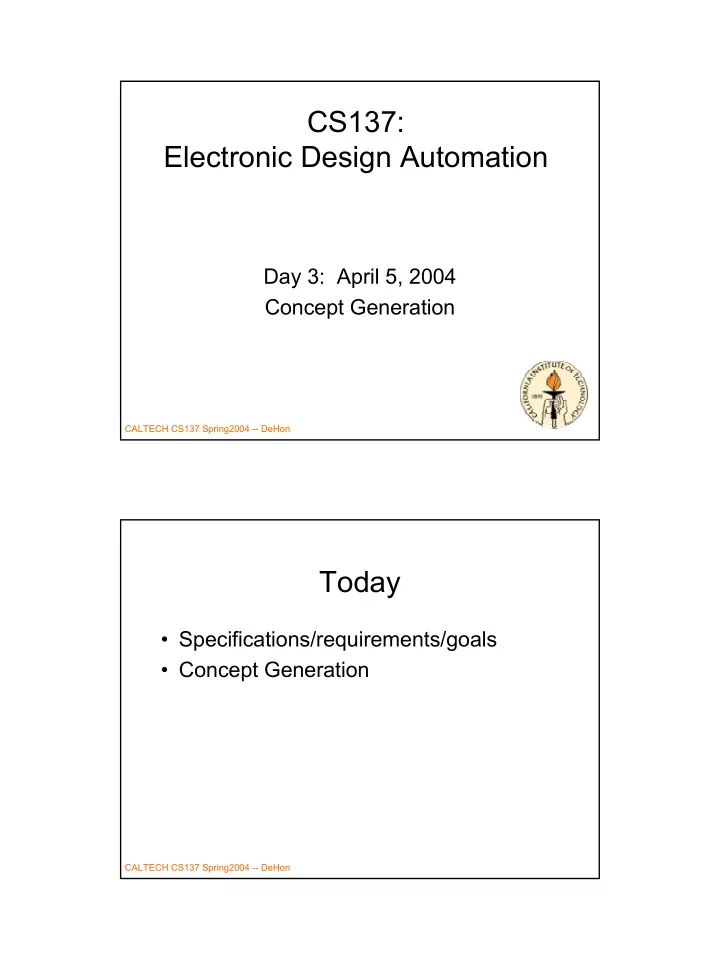

CS137: Electronic Design Automation Day 3: April 5, 2004 Concept Generation CALTECH CS137 Spring2004 -- DeHon Today • Specifications/requirements/goals • Concept Generation CALTECH CS137 Spring2004 -- DeHon 1
Specification • Before can start solving – Need to know what your solving • Before can evaluate “goodness” – Need to know what trying to accomplish – Priorities CALTECH CS137 Spring2004 -- DeHon Quantitative Specification • Typically need to – turn vague specification – into something quantifiable/measurable • Something concrete CALTECH CS137 Spring2004 -- DeHon 2
Specifications • More of a trick/challenge for things that don’t have natural metrics – From: • Door closes easily – To: • Door latches with <5 lbs. Of force… – From: reliable – To: 1 failure in 10 9 hours of operation • 1 undetected failure … CALTECH CS137 Spring2004 -- DeHon Our Specifications • [talk about] CALTECH CS137 Spring2004 -- DeHon 3
Establish Priorities • Which requirement is king? • Which have flexibility? – Can tradeoff? CALTECH CS137 Spring2004 -- DeHon Establish Targets • Acceptable Ranges • Ideal • Usually Relative to alternatives/competitors CALTECH CS137 Spring2004 -- DeHon 4
Our Targets and Priorities • [sketch] – Delay in Solution – Area of logic in Solution – Energy of Solution – Reliability of Solution – Runtime of algorithm – Area for hardware engine to solve problem • Problem formulation should capture priorities CALTECH CS137 Spring2004 -- DeHon Concept Generation CALTECH CS137 Spring2004 -- DeHon 5
Goal of Concept Generation • Fully explore design space – Not miss options – Open minds to possibilities – Know what can do • Competitors can do CALTECH CS137 Spring2004 -- DeHon Components • Structured Approach • Partial Solutions • Uncertainty/Unknown • Documentation CALTECH CS137 Spring2004 -- DeHon 6
Non-Atomic Insight Nothing will ever be attempted, if all possible objections must be first overcome. --- Samuel Johnson, 1759. CALTECH CS137 Spring2004 -- DeHon Uncertainty “Do you remember what I have taught you? Most intelligent beings prefer to live in certainty than uncertainty. Rather than accept uncertainty, they will discount the input of their own senses. It is through this mechanism that mages manipulate the perception of others.” --- Elric to Galen upon his [Elric's] death Invoking the Darkness , Jeanne Cavelos CALTECH CS137 Spring2004 -- DeHon 7
Concept Generation: Steps • Start refined problem specification 1. Clarify/decompose 2. Search – Externally – Internally / brainstorm 3. Explore Systematically 4. Reflect CALTECH CS137 Spring2004 -- DeHon Decompose • Separate components must solve – Divide and conquer • Maybe attack w/ separate passes through process • Focus on bottleneck – Critical path/subproblem – Where most risk is • Most innovation needed CALTECH CS137 Spring2004 -- DeHon 8
Search Externally • Literature – Published / library / IBID – Web – Patents • Customers • Experts • Benchmark related / competitive • Understand state-of-art CALTECH CS137 Spring2004 -- DeHon Search Internally/Brainstorm • Common bugs: –Reject things too early • “Nothing…” quote –Latch onto few ideas • Get stuck in own local minima CALTECH CS137 Spring2004 -- DeHon 9
Search Internally/Brainstorm • Different mode of thinking • Generate lots of ideas • Suspend judgment / no squashing • Barr: grow mode / acid mode • Find good pieces, incomplete ideas • Wishful thinking • Comfortable with uncertainty CALTECH CS137 Spring2004 -- DeHon Brainstorm • Throw out ideas • Write them down … draw pictures • De-personalize – Name by characteristics not person – Not attacking person/idea – Group ownership – Everyone contribute to debugging • Mix-and-match • Good science – Find best ideas, avoid NIH CALTECH CS137 Spring2004 -- DeHon 10
People and Brainstorming • More brains generally good – Maybe limit size of group at a time – Different perspectives good • Group ownership of final product – Involve stake holders – Build confidence in conclusion – Get buy in CALTECH CS137 Spring2004 -- DeHon Systematic Exploration • Parameterized Design Space • Concept combination matrix • Classification tree • Goals: – Find holes – Over-emphasis – Make sure think about all cross products.. CALTECH CS137 Spring2004 -- DeHon 11
Reflect • Really throughout • Comfortable solving problem? – Specification adequate? • Process CALTECH CS137 Spring2004 -- DeHon Time Permitting CALTECH CS137 Spring2004 -- DeHon 12
Discuss • Assumptions • Refine/elaborate specification • Decompose problem CALTECH CS137 Spring2004 -- DeHon 13
Recommend
More recommend